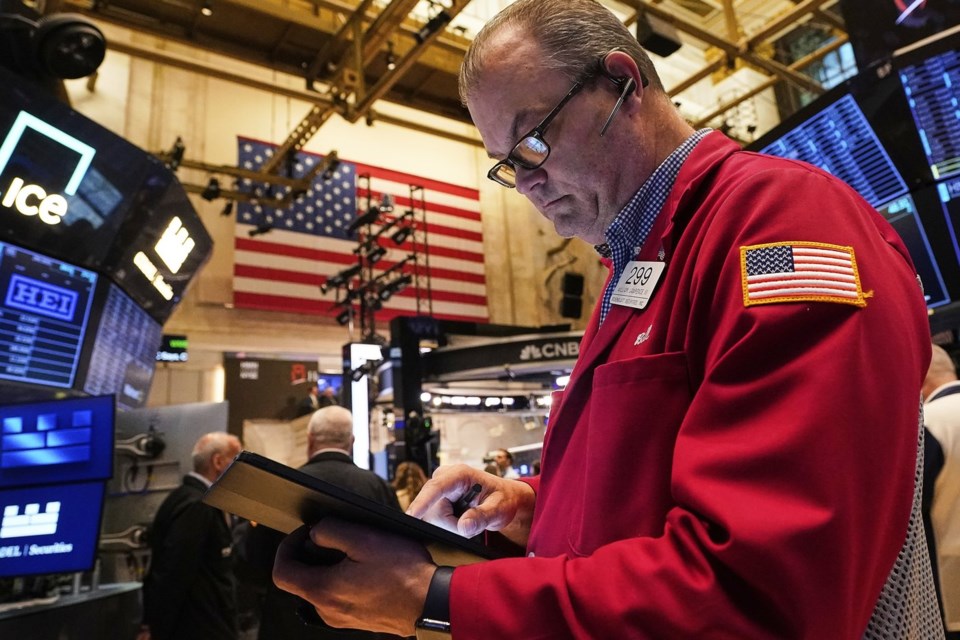NEW YORK (AP) — U.S. stocks are drifting lower following a jumble of mixed reports that shed little clarity on how the U.S. economy is managing through President Donald Trump’s trade war. The S&P 500 slipped 0.4% Thursday and was on track for its first drop of the week. The Dow Jones Industrial Average fell 176 points, and the Nasdaq composite sank 0.7%. Treasury yields also fell following the reports, which altogether suggested the Federal Reserve may have more room to cut interest rates later this year to bolster the U.S. economy if it weakens under the weight of high tariffs. Oil prices fell.
THIS IS A BREAKING NEWS UPDATE. AP’s earlier story follows below.
Wall Street veered lower before the opening bell Thursday and oil prices fell more than $2 a barrel as optimism over a possible rose.
Futures for the S&P 500 and Dow Jones Industrial Average each fell 0.4%. Nasdaq futures dipped 0.6%.
President , visiting Qatar as part of a three-country , has urged the nation to use its influence with Iran to persuade its leadership to dial back its rapidly advancing nuclear program. A deal would help pave the way to ease sanctions against Tehran.
U.S. benchmark crude oil lost $2.37 to $60.78 per barrel. Brent crude, the international standard, gave up $2.32 to $63.70 per barrel.
Oil prices surged early this week after China and the U.S. announced an agreement to each has imposed on the other for 90 days. But they've since retreated after the U.S. Energy Administration reported relatively high crude oil stockpiles that could lead to an oversupply.
In equities markets, Walmart shares rose 2.2% after it reported strong sales but a , and said it has to raise prices due to higher costs from .
Like many other U.S. companies, Walmart did not issue a profit outlook for the quarter because of the chaotic environment around rapidly changing U.S. trade policy. The company maintained its full-year guidance issued in February.
Foot Locker shares nearly doubled after Dick's Sporting Goods said it was for about $2.4 billion. It's the second buyout of a major footwear company in as many weeks as business leaders struggle with uncertainty over how will impact companies that make many of their products overseas.
Last week Skechers announced that it was by 3G Capital for $9 billion.
Dick’s said Thursday that it expects to run Foot Locker as a standalone unit and keep the Foot Locker brands, which include Kids Foot Locker, Champs Sports, WSS and the Japanese sneaker brand atmos.
Foot Locker shares soared more than 80% to $23.57 before the bell. Dick's fell 8.5%.
Elsewhere, China moved to reverse some of its “non-tariff” measures against the U.S. as agreed with Washington in their temporary trade war cease-fire, while demanding that the U.S. side “immediately correct its wrong practices.”
A Chinese Commerce Ministry spokesperson accused the Trump administration of violating world trade rules by announcing that use of Ascend computer chips made by China's Huawei Technologies violates U.S. export controls.
Japan's Nikkei 225 index dropped 1% to 37,775.51. Computer chip-related stocks were among the biggest decliners, with Disco Corp. falling 3.2% and Advantest down 1.1%.
Hong Kong's Hang Seng dropped 0.8% to 23,453.16, while the Shanghai Composite index lost 0.7% to 3,380.82. Taiwan's Taiex fell 0.2%, while India's Sensex rebounded to gain 1.6%.
In Australia, the S&P/ASX 200 edged 0.2% higher to 8,297.50. Â鶹ĘÓƵ Korea's Kospi gave up 0.7% to 2,621.36.
European markets are mixed at midday with Germany’s DAX shedding 0.1%, while the CAC 40 in Paris fell 0.2%. Britain’s FTSE 100 was up 0.3%.
On Thursday, the government will release its April report for inflation at the wholesale level, as well as for retail sales and weekly jobless claims.
The latest retail data is expected to reflect a meager 0.2% sales increase in April, down significantly from a 1.4% gain the previous month.
The stock market has been relatively steady since surging Monday after the U.S. and China announced a . The market gained more ground on Tuesday after the government reported that inflation in April.
Trump has delayed a large swath of his most severe tariffs against America's trading partners, but some import taxes remain in place. Uncertainty over the path ahead continues to hang over businesses and consumers. The on-again-off-again nature of Trump’s trade policy has left companies reluctant to make plans about investment and hiring and consumers nervous about spending.
Businesses continue to trim or withdraw their financial forecasts as they face unpredictable trade policy and cautious consumers.
More than 90% of companies in the S&P 500 have reported earnings for their latest quarter and most reported better-than-expected earnings. But they have cut or scrapped forecasts for the current quarter and even the full year.
Elaine Kurtenbach And Matt Ott, The Associated Press




